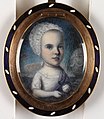Edmund Quincy IV (/ˈkwɪnzi/; 1703-1788) was a prominent Boston merchant during much of the 18th century.
Early life and career

Edmund Quincy was one of four children born to Edmund Quincy III (1681-1737) and Dorothy Flynt Quincy of Braintree (now Quincy) and Boston. He graduated from Harvard College in 1722, and went into the commerce and shipbuilding business with his younger brother Josiah and brother-in-law Edward Jackson. In 1748, the Bethell, a merchant ship they owned, took out a letter of marque to protect itself from Spanish privateers during King George's War. Armed with fourteen guns and six fake wooden guns, the Bethell accidentally came upon a much larger and more heavily armed Spanish ship at night in the Atlantic Ocean. Unable to escape, the Bethell instead demanded that the Spanish ship surrender, and, mistaking the Bethell for a British sloop-of-war, it complied without a fight. The Spanish ship's cargo, consisting of 161 chests of silver, 2 of gold, and various valuable commodities, was brought safely back to Boston and valued at around one hundred thousand pounds sterling.
Josiah Quincy retired shortly after this windfall, while Edmund remained in business, entering into a partnership with his sons. Though well respected, he suffered financial reverses and was declared bankrupt in 1757. He later retired to his paternal estate and, in 1765, published A Treatise on Hemp Husbandry.
Quincy was also an acting magistrate of Suffolk County until the time of his death, and was referred to as "Squire" or "Justice" Quincy.
Family and personal life
Quincy married Elizabeth Wendell in 1725. Together they had nine children, including Dorothy Quincy, who married John Hancock; Esther Quincy, who married Jonathan Sewall; and Elizabeth Quincy, who was the mother of Samuel Sewall. After his first wife's death in 1769, Quincy married Anna Gerrish. Quincy was also a Freemason, and was a member of Master's Lodge along with Richard Gridley.
Edmund Quincy died July 4, 1788, at the age of 85.
-
 John Hancock
John Hancock
-
 Dorothy (Quincy) Hancock
Dorothy (Quincy) Hancock
-
 Lydia Henchman Hancock (1776-1777)
Lydia Henchman Hancock (1776-1777)
-
 John George Washington Hancock (1778-1787)
John George Washington Hancock (1778-1787)
See also
References
- Massachusetts Historical Society (1896). Proceedings of the Massachusetts Historical Society. Massachusetts Historical Society. p. 45. Retrieved 2009-03-20.
- Howard, R.H.; Crocker, Henry E. (1879). A History of New England. Crocker & Co. p. 223. Retrieved 2009-03-20.
- Quincy, Edmund (1874). Life of Josiah Quincy. Little, Brown, and Company. pp. 4–5. Retrieved 2009-03-20.
- ^ Massachusetts Historical Society (1860). Proceedings of the Massachusetts Historical Society. Massachusetts Historical Society. pp. 42–43. Retrieved 2009-03-20.
- Historical Society of Pennsylvania (1879). "Josiah Quincy, Snr". The Pennsylvania Magazine of History and Biography: 182. Retrieved 2009-03-20.
- ^ "Massachusetts Historical Society: Quincy, Wendell, Holmes, and Upham Family Papers, 1633-1910". Archived from the original on 2013-11-26. Retrieved 2009-03-20.
- ^ Quincy, Josiah; Quincy, Eliza Susan Morton (1875). Memoir of the Life of Josiah Quincy, Junior, of Massachusetts Bay, 1744-1775. Little, Brown. pp. 3. Retrieved 2009-03-20.
- Adams, Oscar Fay (1904). A dictionary of American authors (5th ed.). Houghton, Mifflin and company. pp. 306. Retrieved 2009-03-20.
- Stark, James Henry (1910). The Loyalists of Massachusetts and the Other Side of the American Revolution. Salem Press. pp. 455. Retrieved 2009-03-20.
- Triber, Jayne E. (2001). A True Republican: The Life of Paul Revere. Univ of Massachusetts Press. p. 206. ISBN 978-1-55849-294-3. Retrieved 2009-03-20.
- Allen, William (1857). The American biographical dictionary. J.P. Jewett and Company. pp. 688. Retrieved 2009-03-20.
| John Hancock | |
|---|---|
| United States founding events |
|
| Life | |
| Related | |
| Legacy |
|
| Family |
|